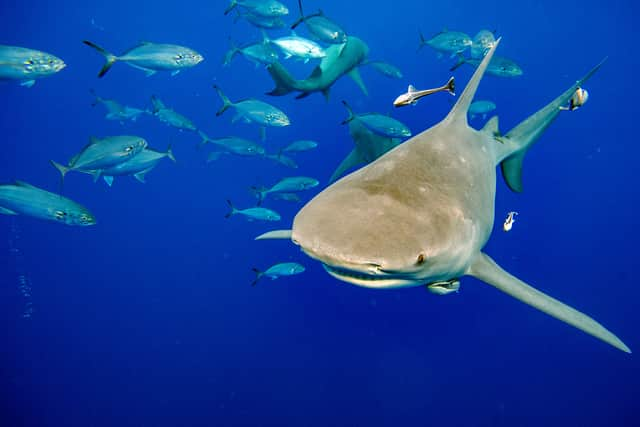Cocaine Sharks: Experts say marine animals may be feasting on drugs dumped off Florida
and live on Freeview channel 276
Floridian sharks are consuming bales of cocaine leading to them act in "crazy ways", scientists have said.
In a series of documentaries by Discovery, titled Shark Week, researchers investigated whether drugs dumped overboard impact marine life after they found some sharks appeared to be acting strangely.
Advertisement
Hide AdAdvertisement
Hide AdAs smugglers leave bales of cocaine in the seas around Florida, either to be collected or to avoid arrest, the drugs are often washed ashore through ocean currents.


Last month, the US Coast Guard announced it had recovered over $186m worth of illegal narcotics from the waters of the Caribbean and southern Florida.
Documentary, Cocaine Sharks, is expected to be among the biggest draws of Shark Week. During the making of the programme, marine biologist, Tom 'The Blowfish' Hird, and University of Florida environmental scientist, Tracy Fanara, studied sharks off the Florida Keys to see if the drugs were having any impact on them.
Their research was conducted during six days at sea in the area of the ecologically sensitive island chain off the state’s southern tip.
Advertisement
Hide AdAdvertisement
Hide AdIn one dive, they saw a hammerhead, a species that would usually swim away from humans, came directly towards the divers, moving erratically.
Also observed was a sandbar shark swimming in circles as it focused on an imaginary object.
Researchers also put packages similar in size and appearance to real cocaine bales in the water next to dummy swans as part of their study.
The sharks went straight for the bales - not the swans - and took bites from them. One shark even grabbed a bale and swam off with it.
Advertisement
Hide AdAdvertisement
Hide AdNext, the researchers made a bait ball of highly concentrated fish powder - designed to trigger a dopamine rush as close to a hit of cocaine as the team could feasibly (and ethically) do in an experiment.
When the sharks ate the powder, the researchers saw them going wild.
In the film, Mr Hird said: "I think we have got a potential scenario of what it may look like if you gave sharks cocaine. We gave them what I think is the next best thing. [It] set [their] brains aflame. It was crazy."
“While we were in the Keys filming, cocaine bales were washing ashore, like twice in one week, so it’s really a prevalent issue,” Fanara said.
Advertisement
Hide AdAdvertisement
Hide Ad“At the end of every research publication you read ‘more research must be done’, and that’s definitely the conclusion from this,” she said, noting previous studies of polluted inland waterways also suggest fish had become addicted to methamphetamine."
In the coming months, Fanara plans to partner with other Florida marine scientists to take blood samples from some of the sharks to look at cocaine levels.
She said she hoped those who watched Cocaine Sharks would appreciate the threat to marine life and Earth’s fragile ocean ecosystem from pollutants in the water.
“It’s like a game of Jenga where we’re at the top,” she said. “We’re in the sixth mass extinction and the more chemicals we introduce, the more radical changes we introduce, the more precarious it gets.
Advertisement
Hide AdAdvertisement
Hide Ad“These animals are leaving one by one and the integrity of the tower is depleting, even if we might not feel it right now. At some point, the tower’s going to fall.”
Cocaine Sharks is scheduled to air Wednesday, 26 July at 10pm ET
Comment Guidelines
National World encourages reader discussion on our stories. User feedback, insights and back-and-forth exchanges add a rich layer of context to reporting. Please review our Community Guidelines before commenting.
